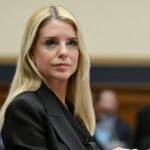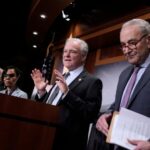
Authored by Gabrielle Bauer via The Brownstone Institute,
Remember the mega-hit book The Bonfire of the Vanities? While a work of fiction, the book shone a harsh light on the all-too-real world of lies, corruption, and hypocrisy in high places. In one of my favorite scenes, the power-couple protagonists attend a party at the home of the aptly named Bavardage family, where all the guests blab at each other with deep-fake enthusiasm, making sure to display their “boiling teeth” at all times.
Like the high society portrayed in the book, the Covid regime was replete with rot, from taped-up basketball nets and masked toddlers to vaccine passports and… slogans. Some of the slogans were carefully crafted by governments, while others sprang from the weeds of social media. They all drew from the same playbook, capitalizing on fear and using emotional manipulation to activate people’s guilt circuits. They served as thought-stopping mantras that precluded honest communication about the pandemic. To anyone with even a slightly nuanced worldview, their plodding earnestness grated like an earworm.
With three years of pandemic history behind us, it’s high time to put these clunkers to bed.
I’ve collected a baker’s dozen of the slogans that have dogged us for the past three years, and explain why they deserve to be torched and thrown into an unmarked grave.
Two weeks to flatten the curve. Here’s a case where a big fat laugh emoji would do the job of a thousand words. Anyone remember what happened when the two weeks were up? Yeah, so do I. The “experts” decided that we need to keep doing something. And that something was more lockdowns.
Stay home, save lives. This sanctimonious and bossy slogan sent the message that mental health didn’t count, livelihoods didn’t count, arts and culture didn’t count, religious communion didn’t count, and the dreams people had spent years pursuing didn’t count. The only thing that counted was preserving metabolic life—or at least, pretending we were doing that.
Follow the science. I’m not the first person to note that the only constant in science is change. Questioning science is science. But that’s not even the main reason “Follow the science” makes no sense. Science is information. It tells you what is, not what to do about it. That depends on our values: How important do we consider attendance at school? Live music and theater? Comforting people at the end of life? There are no mathematical coefficients for weighting these parameters. Health policy professor Leana Wen put it well in a recent Washington Post article: “Underneath it all is values: Whose rights are paramount? The individual who must give up freedoms, or those around them who want to lower infection risk? Yes, science should guide such debates, but it cannot lead all the way to the answer.”
We’re all in this together. Is that so? Was the worker delivering DoorDash orders in the same boat as the Netflix-and-chill couples perfecting new sourdough recipes during lockdown? Was the event planner who lost a 10-year business in the same boat as the Amazon shareholders? Was the foreign student stuck in a low-ceilinged apartment in the same boat as the well-connected mom who hired a power tutor for her kids?
Muh freedumb. During Covid, safety became the all-consuming preoccupation and freedom got branded as right-wing stupidity. Freedom to take a walk on the beach? Stop killing the vulnerable! Freedom to earn a living? The economy will recover! The demotion of freedom—that noble ideal of liberal democracy—to a caricature has been painful to observe. Without freedom, we have nothing resembling a life. Pandemic or not, freedom needs a place at the discussion table.
Mask it or casket. Hyperbole much? The glib phrase was designed to frighten, rather than inform, its cuteness making it all the more irritating. When a statement deviates so sharply from reality, it loses its power. People don’t take it seriously, even if they insist on Twitter that they do.
The virus doesn’t discriminate. This one was especially weaselly because it contained a grain of truth that people could latch onto. Young or old, healthy or frail, anyone could catch the virus. But the risk of serious harm from the virus was orders of magnitude higher in certain groups, especially the old and frail. Experts downplayed this sharp risk gradient, plunging everyone into an abyss of fear. Not cool.
Can’t do X if you’re dead. We heard this a lot in the early months, as a justification for maintaining this or that restriction. You can’t attend a jazz concert if you’re dead. You can’t go backpacking in Nepal if you’re dead. For all its slickness, the slogan doesn’t stand up to logical scrutiny. It sets an actual scenario (restriction on an activity) against an improbable counterfactual (dying if the restriction is lifted). It’s like warning someone who’s about to drive across country, which is riskier than taking a bus, that “you can’t enjoy the coastal cities if you’re dead.” Said nobody ever.
Listen to the experts. OK, but which experts? The scientists that governments allowed to speak? What about the scientists with hundreds of citations in prestigious journals but divergent views? Can we listen to them, too? And what about mental health experts? Or economists? Historians? Bioethicists and philosophers? A pandemic isn’t just a scientific problem to solve, but a human one. Scientists do not get to decide what gives meaning to life and what trade-offs are worth making when steering the human family through a pandemic. Some of the sharpest insights about Covid have come from people outside of science. We ignore them at our own peril.
My mask protects you, your mask protects me. More naked emotional manipulation. The message was clear: if you don’t mask, you’re a bad person (presumably a fate worse than death). In fact, the mask is more of a cultural signifier than a viral transmission blocker. As the recent Cochrane review of physical interventions to slow viral transmission has made clear, whatever evidence exists for community masking is underwhelming at best.
Pandemic of the unvaccinated. That one aged rather poorly. A February 2023 Lancet article concluded that the “SARS-CoV-2 vaccines are insufficiently efficacious in preventing infections.” We can debate the fine points, but by now we all know that vaccinated people both catch and transmit Covid. What’s more, a Danish meta-analysis was unable to find credible evidence that mRNA vaccines reduced mortality, leaving statisticians with the unenviable job of torturing the data in subgroup analyses. (Perhaps six-toed people born on a Tuesday have lower hospitalization rates during the month after getting their boosters.) I started out with a lot of hope in the vaccines. I got vaxxed up and boosted myself. But let’s call a spade a spade: the vaccine purveyors overpromised and underdelivered.
You may be done with Covid, but Covid isn’t done with you. The statement isn’t the gotcha that people think it is. Of course Covid isn’t done with us. Neither is the common cold or the flu. Neither are thunderstorms and volcanoes and earthquakes and a thousand other forces of nature. When people say they’re done with Covid, they simply mean they’re done turning the world into an infection control zone. “I believe that pandemics end partially because humans declare them at an end,” says University of New Hampshire history professor Marion Dorsey, quoted from a Scientific American article titled “People, not science, decide when a pandemic is over.” Spanish flu chronicler John Barry concurs: a pandemic ends “when people stop paying attention to it.” And there’s nothing the shrinking cast of Covidians can do about it.
Stay safe. These words, generally used at the end of a social interaction, became the verbal equivalent of touching wood—a knee-jerk utterance to ward off the evil eye. It always reminded me of the “praise be” muttered by the handmaids in Margaret Atwood’s iconic novel: mechanical and dystopian. One of my friends responds to the words with “Stay dangerous.” Stay alert, stay curious, stay ready to think for yourself. If there’s anything I wish for us all in year four of the Covid era, it’s this.
Authored by Gabrielle Bauer via The Brownstone Institute,
Remember the mega-hit book The Bonfire of the Vanities? While a work of fiction, the book shone a harsh light on the all-too-real world of lies, corruption, and hypocrisy in high places. In one of my favorite scenes, the power-couple protagonists attend a party at the home of the aptly named Bavardage family, where all the guests blab at each other with deep-fake enthusiasm, making sure to display their “boiling teeth” at all times.
Like the high society portrayed in the book, the Covid regime was replete with rot, from taped-up basketball nets and masked toddlers to vaccine passports and… slogans. Some of the slogans were carefully crafted by governments, while others sprang from the weeds of social media. They all drew from the same playbook, capitalizing on fear and using emotional manipulation to activate people’s guilt circuits. They served as thought-stopping mantras that precluded honest communication about the pandemic. To anyone with even a slightly nuanced worldview, their plodding earnestness grated like an earworm.
With three years of pandemic history behind us, it’s high time to put these clunkers to bed.
I’ve collected a baker’s dozen of the slogans that have dogged us for the past three years, and explain why they deserve to be torched and thrown into an unmarked grave.
Two weeks to flatten the curve. Here’s a case where a big fat laugh emoji would do the job of a thousand words. Anyone remember what happened when the two weeks were up? Yeah, so do I. The “experts” decided that we need to keep doing something. And that something was more lockdowns.
Stay home, save lives. This sanctimonious and bossy slogan sent the message that mental health didn’t count, livelihoods didn’t count, arts and culture didn’t count, religious communion didn’t count, and the dreams people had spent years pursuing didn’t count. The only thing that counted was preserving metabolic life—or at least, pretending we were doing that.
Follow the science. I’m not the first person to note that the only constant in science is change. Questioning science is science. But that’s not even the main reason “Follow the science” makes no sense. Science is information. It tells you what is, not what to do about it. That depends on our values: How important do we consider attendance at school? Live music and theater? Comforting people at the end of life? There are no mathematical coefficients for weighting these parameters. Health policy professor Leana Wen put it well in a recent Washington Post article: “Underneath it all is values: Whose rights are paramount? The individual who must give up freedoms, or those around them who want to lower infection risk? Yes, science should guide such debates, but it cannot lead all the way to the answer.”
We’re all in this together. Is that so? Was the worker delivering DoorDash orders in the same boat as the Netflix-and-chill couples perfecting new sourdough recipes during lockdown? Was the event planner who lost a 10-year business in the same boat as the Amazon shareholders? Was the foreign student stuck in a low-ceilinged apartment in the same boat as the well-connected mom who hired a power tutor for her kids?
Muh freedumb. During Covid, safety became the all-consuming preoccupation and freedom got branded as right-wing stupidity. Freedom to take a walk on the beach? Stop killing the vulnerable! Freedom to earn a living? The economy will recover! The demotion of freedom—that noble ideal of liberal democracy—to a caricature has been painful to observe. Without freedom, we have nothing resembling a life. Pandemic or not, freedom needs a place at the discussion table.
Mask it or casket. Hyperbole much? The glib phrase was designed to frighten, rather than inform, its cuteness making it all the more irritating. When a statement deviates so sharply from reality, it loses its power. People don’t take it seriously, even if they insist on Twitter that they do.
The virus doesn’t discriminate. This one was especially weaselly because it contained a grain of truth that people could latch onto. Young or old, healthy or frail, anyone could catch the virus. But the risk of serious harm from the virus was orders of magnitude higher in certain groups, especially the old and frail. Experts downplayed this sharp risk gradient, plunging everyone into an abyss of fear. Not cool.
Can’t do X if you’re dead. We heard this a lot in the early months, as a justification for maintaining this or that restriction. You can’t attend a jazz concert if you’re dead. You can’t go backpacking in Nepal if you’re dead. For all its slickness, the slogan doesn’t stand up to logical scrutiny. It sets an actual scenario (restriction on an activity) against an improbable counterfactual (dying if the restriction is lifted). It’s like warning someone who’s about to drive across country, which is riskier than taking a bus, that “you can’t enjoy the coastal cities if you’re dead.” Said nobody ever.
Listen to the experts. OK, but which experts? The scientists that governments allowed to speak? What about the scientists with hundreds of citations in prestigious journals but divergent views? Can we listen to them, too? And what about mental health experts? Or economists? Historians? Bioethicists and philosophers? A pandemic isn’t just a scientific problem to solve, but a human one. Scientists do not get to decide what gives meaning to life and what trade-offs are worth making when steering the human family through a pandemic. Some of the sharpest insights about Covid have come from people outside of science. We ignore them at our own peril.
My mask protects you, your mask protects me. More naked emotional manipulation. The message was clear: if you don’t mask, you’re a bad person (presumably a fate worse than death). In fact, the mask is more of a cultural signifier than a viral transmission blocker. As the recent Cochrane review of physical interventions to slow viral transmission has made clear, whatever evidence exists for community masking is underwhelming at best.
Pandemic of the unvaccinated. That one aged rather poorly. A February 2023 Lancet article concluded that the “SARS-CoV-2 vaccines are insufficiently efficacious in preventing infections.” We can debate the fine points, but by now we all know that vaccinated people both catch and transmit Covid. What’s more, a Danish meta-analysis was unable to find credible evidence that mRNA vaccines reduced mortality, leaving statisticians with the unenviable job of torturing the data in subgroup analyses. (Perhaps six-toed people born on a Tuesday have lower hospitalization rates during the month after getting their boosters.) I started out with a lot of hope in the vaccines. I got vaxxed up and boosted myself. But let’s call a spade a spade: the vaccine purveyors overpromised and underdelivered.
You may be done with Covid, but Covid isn’t done with you. The statement isn’t the gotcha that people think it is. Of course Covid isn’t done with us. Neither is the common cold or the flu. Neither are thunderstorms and volcanoes and earthquakes and a thousand other forces of nature. When people say they’re done with Covid, they simply mean they’re done turning the world into an infection control zone. “I believe that pandemics end partially because humans declare them at an end,” says University of New Hampshire history professor Marion Dorsey, quoted from a Scientific American article titled “People, not science, decide when a pandemic is over.” Spanish flu chronicler John Barry concurs: a pandemic ends “when people stop paying attention to it.” And there’s nothing the shrinking cast of Covidians can do about it.
Stay safe. These words, generally used at the end of a social interaction, became the verbal equivalent of touching wood—a knee-jerk utterance to ward off the evil eye. It always reminded me of the “praise be” muttered by the handmaids in Margaret Atwood’s iconic novel: mechanical and dystopian. One of my friends responds to the words with “Stay dangerous.” Stay alert, stay curious, stay ready to think for yourself. If there’s anything I wish for us all in year four of the Covid era, it’s this.
Loading…







